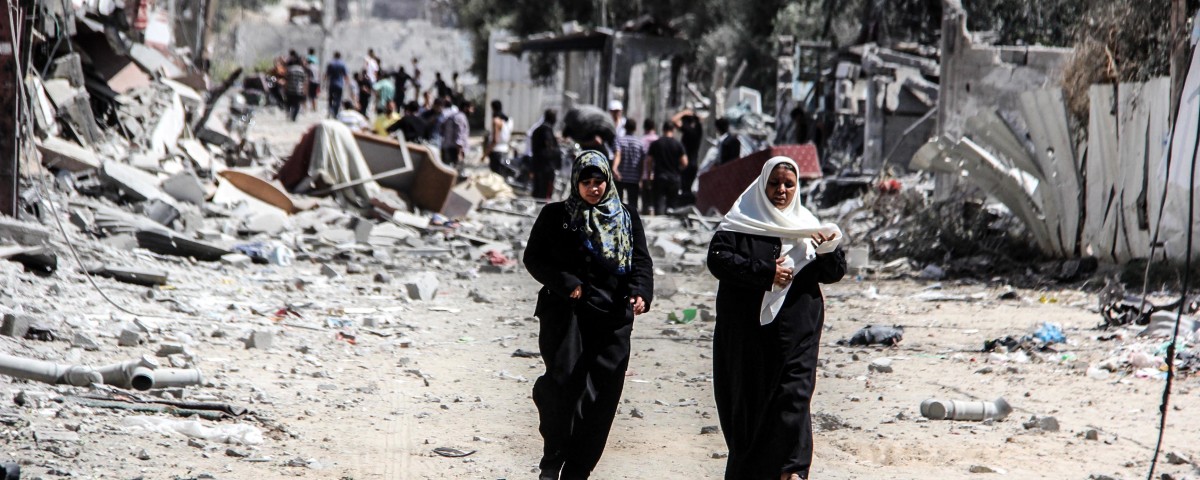Women and children are particularly vulnerable in times of war and blockade. Since 2007, Israel and Egypt have imposed a land, air and sea blockade of the Gaza Strip. They control all of the the borders and the movement of people and goods allowed into and out of the Strip. On this tiny piece of land, how do women manage to live their lives under such terrible conditions?
In 2015, over 8% of Gazan households were headed by women. According to Office for the Coordination of Humanitarian Affairs (OCHA) nearly 800 women were widowed as a result of the Israeli terror of 2014. Nearly 24,000 girls and 23,000 women are still displaced following the destruction or damage of their homes during the hostilities. They have been forced into temporary accommodation with host families, in rented apartments, prefabricated units, tents and makeshift shelters and some, in the rubble of their previous homes. Such precarious housing, raises a range of protection concerns.
According to the latest figures, more than 70% of households receive only 6-8 hours of piped water every few days, whilst the entire population suffers from scheduled electricity blackouts for 12-14 hours a day, as Israeli bombs have destroyed the electricity plants. This decline in basic services, has undermined the ability of most of the women and girls to engage in income generating activities or to have time for their own needs. This is also linked to the traditional division of labour in the Palestine society, where women and girls bear the primary responsibility for the functioning and maintenance of households, which have become more time- consuming.
Gazan cooking style is similar to culinary styles adopted by the rest of the Levant countries and is strongly influenced by the Mediterranean coast. Gaza used to have a major fishing industry, with fish being the staple food for the majority of the inhabitants in the area. And women and girls highly skilled in cooking fish. One of the popular dishes was a grilled fish that had been stuffed with cilantro, garlic, red pepper and cumin and marinated in a mix of coriander, red peppers, cumin, and chopped lemons. This is now history for most of the people as since 2014 the Israeli Navy has attacked fishers more than 300 times. In the last two years, the Israeli Navy has killed 9 fishers and detained 422 fishers. According to the Oslo Accords the fishing limit outside the coast should be 20 nautical miles, but Palestinian fishers can at best only fish 3 nautical miles from land, where the fish are too small and insufficient to feed a family.
Education is supposed to create a point of departure for paid jobs, but not so in blockaded and bombed Gaza. Whilst both sexes attend schools and Universities, years of underfunding have left the educational system in Gaza overstretched and truncated, with nearly 95% of schools operating in a double-shift basis, with one `school` of students in the morning and one in the afternoon. The United Nations’ Relief and Works Agency for Palestine (UNRWA) has launched a healthy lifestyle campaign in the Gaza schools, which aims at raising awareness amongst educational staff, students, refugee communities and others to promote a healthy school environment.
Most of the employed women are concentrated in two economic sectors. According to the UN Women-Palestine Country Office, 76% of Palestinian women in Gaza are working in services and only 17.5% in agriculture. Unemployment is highest among women: 82.6% of females between 15-29 years; 74% of single females; 63.6% of married females, whilst 37.4% men (OCHA). Many of the educated mothers are more or less single, as they are active in local politics and searching for jobs, whilst taking care of their children when their husbands are in and out of Israeli prisons.
Some women are trying to create jobs themselves. One such initiative is `6 Flowers` which was established in 2014. Instead of giving their work as gifts, a few women started to make and sell traditional Gazan embroideries. After a successful exhibition, they sent some of their work to Qatar and received some payments. However, when they wanted to send their work to more countries, Israel prevented them from doing so – one more way in which Israel prevents the Palestinians of Gaza from prospering.
Women are the invisible and real heroes of Gaza.
Written by: Gerd von der Lippe Photo by: 'Women in Gaza'/@Samar Abu Elouf

